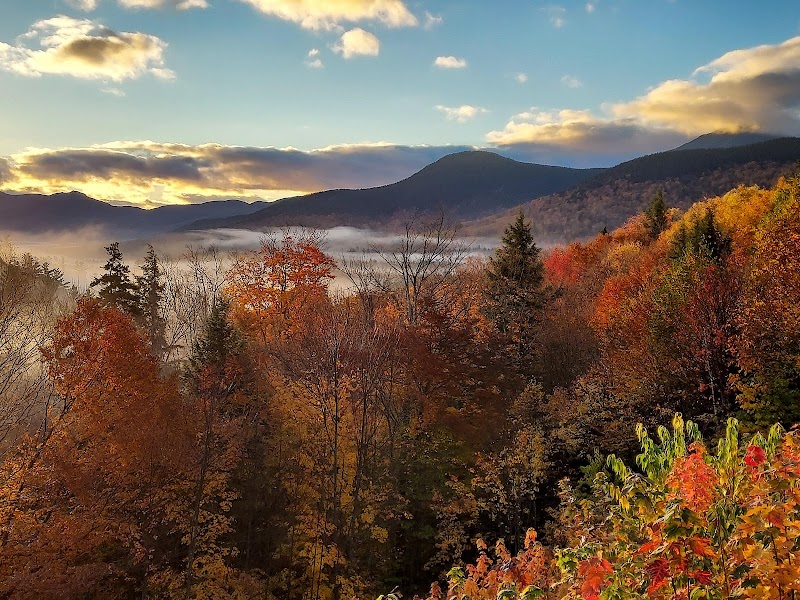
Climbing the Flume: Granite Walls and Gorge Hikes in Franconia Notch
Franconia Notch’s Flume Gorge invites hikers into a dynamic world where granite walls rise steeply and water courses with fierce energy. This accessible yet thrilling hike blends geological spectacle with forested calm, perfect for those who seek adventure grounded in nature’s enduring power.
Wear Non-Slip Footwear
The gorge’s granite surfaces stay slick from constant water spray; hiking shoes with good traction will keep you safe.
Hydrate Thoroughly
Bring ample water even for short hikes; the exertion among cool forests can mask dehydration risk.
Start Early
The trail grows popular midday; early visits provide a quieter experience and better photo light.
Check Weather and Trail Status
Heavy rain can swell waters and make paths hazardous; verify conditions before heading out.
Climbing the Flume: Granite Walls and Gorge Hikes in Franconia Notch
Franconia Notch State Park in New Hampshire summons adventurers with its rugged granite cliffs and the roaring Flume Gorge, a natural marvel carved by relentless water over thousands of years. The hike through The Flume Gorge trail is approachable yet thrilling—2 miles round trip, with an elevation gain around 400 feet. The pounding waters below dare you forward as you navigate narrow boardwalks clinging tightly to sheer granite walls that feel fiercely ancient and alive. Pine and birch crowds the path on both sides, their roots gripping the earth with patient persistence.
Starting at the base, the trail leads you into the gorge’s tight hold where the avalanche-born granite slabs tower upwards, pressing the sky into a thin ribbon above. The constant rush of the Flume Brook is a steady presence, its currents pushing and pulling with a voice that demands respect. Along the way, various waterfalls spill like silver threads, each a reminder of the gorge’s slow but inexorable shaping force.
Beyond The Flume, the auto road access allows travelers to extend their exploration with the nearby Basin, where water has smoothed massive granite basins, and the Liberty Springs Trail, which climbs for spectacular views of the notch and beyond. This combination gives a layered experience—close encounters with geological history paired with broader mountain panoramas.
Pragmatically, sturdy footwear with good grip is non-negotiable due to wet surfaces and occasional slippery rocks. Water bottles should stay full; hydration is vital even on a short trek where the cool forest masks steady exertion. Weekdays and early mornings offer quieter moments, while afternoons can fill with families and groups.
Timing your visit in late spring through early fall strikes a balance between clear trails and lively cascades—snowmelt feeds robust water flow in May, though some paths may still hold wet patches or mud. Fall adds a crispness to the air and bursts of color in the surrounding foliage that amplify the raw, mineral textures of granite.
Climbing the Flume isn’t about conquering a peak; it’s a dialogue with a place fiercely itself, where stone and water press their ancient story on every step. Approach with respect and curiosity, and Franconia Notch rewards with an adventure rich in sensory detail and geological wonder.
Nearby Trips
All Adventures
Boat Charters
Water Activities
Adventures near Lincoln, New Hampshire
Discover the unique and memorable adventures that make Lincoln, New Hampshire special.
Frequently Asked Questions
Is the Flume Gorge hike suitable for children?
Yes, the Flume Gorge trail is family-friendly, but parents should watch kids closely along narrow boardwalk sections and slippery areas near water.
How long does it take to hike The Flume Gorge trail?
Most hikers complete the round-trip hike in 2 to 3 hours, allowing time for stops and photography.
Are dogs allowed on the Flume Gorge trails?
Dogs are generally not permitted within the Flume Gorge itself to protect the fragile environment, but they are allowed on some surrounding trails with leash requirements.
Is climbing involved on the Flume Gorge hike?
The trail traverses steep granite walls via boardwalks and stairs, but no technical climbing gear or skills are required.
When is the best time of day to visit for photography?
Morning and late afternoon offer softer light and fewer crowds, enhancing photographic opportunities around waterfalls and granite formations.
Are there facilities available near the trailhead?
Yes, Franconia Notch State Park visitor centers provide restrooms and informational resources near the Flume Gorge parking areas.
Recommended Gear
Sturdy Hiking Boots
Protect ankles and offer grip on wet granite and uneven terrain.
Water Bottle or Hydration Pack
Hydration is critical due to exertion and microclimate dampness.
Light Rain Jacket
Spring showers and spray from waterfalls can leave you damp and chilly.
Camera or Smartphone
Capture the gorge’s dynamic contrasts of water, stone, and forest.
Local Insights
Hidden Gems
- "The Liberty Springs Trail offers panoramic views beyond the gorge, less trafficked yet rewarding."
- "Small pools along the Flume Brook provide excellent quiet spots for reflection and wildlife observation."
Wildlife
- "Keep an eye out for black-capped chickadees, northwestern salamanders near wet areas, and occasional white-tailed deer at dawn or dusk."
History
"The Flume Gorge was first privately owned and a tourist attraction in the 19th century before becoming part of Franconia Notch State Park. Its exposed granite walls are relics of ancient avalanches and glaciation."
